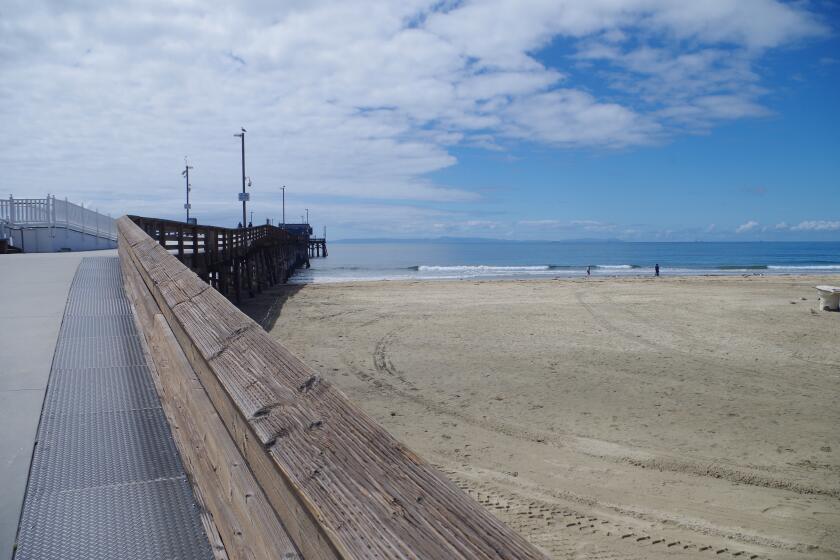Speaking out for the sea creatures
- Share via
CATHARINE COOPER
Politically, I’m aligning myself with the dolphins and the whales.
They need me a great deal more than any of the political parties. In
fact, they need me because of the political parties, because they are
unable to speak -- at least in a language that we can understand --
for themselves. And the right, left and middle are too engaged in a
battle for supremacy to currently notice what’s just below the
water’s edge.
It isn’t just the dolphins and the whales who need my voice.
Rather, it is the entire marine ecosystem, which, if you haven’t
noticed, is in serious trouble. Those of us who live along the
southern shores of California are more aware than most, at least of
the affects of urban runoff and the havoc it wreaks with our local
beaches. Bacterial and fecal counts have rendered our waters unsafe
for swimming on numerous occasions. “Don’t go near the water” is a
tragic statement on a sunny day with great surf.
Beyond our precious coastline, the deterioration of the marine
ecosystem continues to escalate. The recently released Pew Oceans
Commission report reveals broad and widespread issues. But the most
disturbing is that the primary impedi-
ment to ocean conser-
vation is a broad lack of public awareness of the importance of
the oceans by Americans, opinion leaders and policy makers.
The world is a complicated place to live, with constantly
expanding needs all vying for attention. War, famine and disease --
those items that seem to directly affect the health of the human
population -- grab the bulk of media attention and political
currency. The oceans appear vast and able to fend for themselves.
This is simply not the case.
The majority of water pollutants are invisible, and the toxins
that appear in the food chain are consumed without visual clues.
Trawler dragging destroys coral and seabeds. Urban runoff chokes
habitats and creates dead zones. Commercial fisheries run unchecked.
We view our oceans as beautiful, and they are, but each and every
day, another human action takes an unprecedented toll on a dwindling
resource.
The Pew Oceans Commission is an 18-member, independent, bipartisan
panel comprised of a broad spectrum of citizens, government officials
and those whose livelihood is dependent upon the seas. They spent
three years in a study of the awareness of ocean issues across the
country, soliciting concerns and knowledge in such varied locales as
Hawaii, Alaska, Maine, South Carolina, New York, Louisiana and even
Iowa. Their 2004 report lists major threats to our oceans: “point”
and “nonpoint” pollution, invasive species, aquaculture, coastal
development, overfishing, habitat alteration and climate change.
How do we measure something like overfishing? One term used in an
analysis is “shifting baselines,” coined by fisheries biologist
Daniel Pauly in 1995. Shifting baselines affect the quality-of-life
decisions we face daily. They are chronic, slow, hard-to-notice
changes in things, like the disappearance of birds and frogs in the
countryside, the loss of local abalone in the waters, or the increase
in drive time from San Diego to Los Angeles. If your weight used to
be 150 and now it’s 160, your baseline (as well as your body shape),
has shifted.
Among environmentalists, a baseline is an important reference
point for measuring the health of the ecosystem. It provides
information against which to measure change. In an ideal world, the
baseline for any given habitat would be what was there before humans
had much impact.
Can we determine baselines before they shift again? Measuring the
temperature of the earth’s surface and the ocean’s waters, and
measuring the composition of the atmosphere can provide us with
scientific data that will aid in making decisions to deter global
warming. Understanding the significance of a measured loss of fish
habitat and fertility should aid in policy making and legislation.
We stand on a brink of rather daunting marine disasters, and they
are not blatantly apparent, except to those involved in their
research and analysis. A cadre of foundations, including Surfrider,
the Ocean Conservancy and Scripps Institute of Oceanography, are
mounting major media campaigns to call attention to the overall
decline of ocean health. The campaigns should increase our awareness,
but it is action and commitment that are needed.
Since those whales and dolphins seem to struggle for our ear, it’s
up to us to be loudly vocal on their behalf. They cannot stop us from
dumping toxins or poisons, from overfishing or overbuilding, or from
messing with the climate that affects their existence. It is up to us
to take these issues to our politicians, whatever their party
leanings, because in this democracy, it’s the noisy parts that get
attention. So speak up. Take a stand. Make a whale proud.
* CATHARINE COOPER loves wild places (and is currently in the
midst of the Arctic Wildlife Refuge paddling up the Kungakut River).
She can be reached at [email protected].
All the latest on Orange County from Orange County.
Get our free TimesOC newsletter.
You may occasionally receive promotional content from the Daily Pilot.



